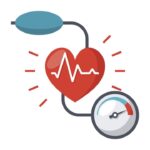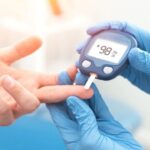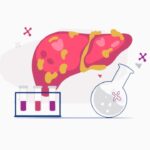Hypertension progresses stealthily with few noticeable symptoms, yet it can lead to severe complications such as blindness, kidney failure, heart failure, heart attacks, strokes, and a high risk of mortality. Recognizing the symptoms of hypertension early and understanding how to monitor blood pressure can help prevent these dangerous outcomes.
1. What Constitutes High Blood Pressure?
Hypertension, or high blood pressure, occurs when the force of blood against the artery walls is consistently too high as the heart pumps blood. According to the World Health Organization and the International Society of Hypertension, an individual is diagnosed with hypertension if their systolic blood pressure is above 140 mmHg and/or their diastolic blood pressure is above 90 mmHg.
While hypertension is more common in older adults, its prevalence among younger individuals is increasing. In Vietnam, approximately 12 million people have hypertension, meaning that one in five adults is affected. If left undetected and untreated, high blood pressure can lead to heart damage, strokes, and numerous other complications.
For accurate blood pressure readings, consider the following tips:
– Avoid stimulants (alcohol, coffee, tobacco) before measuring.
– Empty your bladder before the test.
– Rest for at least 5 minutes before measuring.
– Measure blood pressure at least twice, either while seated or lying down.

High blood pressure is a very serious condition with significant health consequences.
2. Common Symptoms of Hypertension
Blood pressure can rise without any noticeable symptoms. In many cases, signs appear subtly, only becoming evident when hypertension is severe. Warning signs of high blood pressure include:
– Severe headaches
– Vision impairment
– Shortness of breath
– Palpitations and chest pain
– Irregular heartbeat
– Blood in the urine
– General fatigue
3. Causes of Hypertension
For most adults, the cause of hypertension is unknown, with about 90% of cases classified as primary hypertension. Only 10% of cases have identifiable causes.
Common risk factors for high blood pressure include:
– Age: The risk increases with age.
– Family history: A family history of high blood pressure significantly raises the risk.
– Gender: Men over 45 are at higher risk, while women often experience high blood pressure post-menopause.
– Chronic diseases: Conditions such as diabetes, cardiovascular disease, and dyslipidemia can cause high blood pressure.
– Obesity: Higher body weight increases the risk of hypertension.
– High salt intake: Salt increases water absorption into the blood, raising blood pressure.
– Diet: Diets high in saturated fats can lead to hypertension.
– Alcohol and stimulants: Frequent consumption of alcohol and other harmful substances increases risk.
– Sedentary lifestyle: Lack of exercise contributes to high blood pressure.
– Psychological stress: Stress can elevate blood pressure.
– Medications: Certain drugs, like oral contraceptives and non-steroidal anti-inflammatory drugs (NSAIDs), can raise blood pressure.
– Pregnancy-related conditions: Conditions such as preeclampsia can cause high blood pressure.
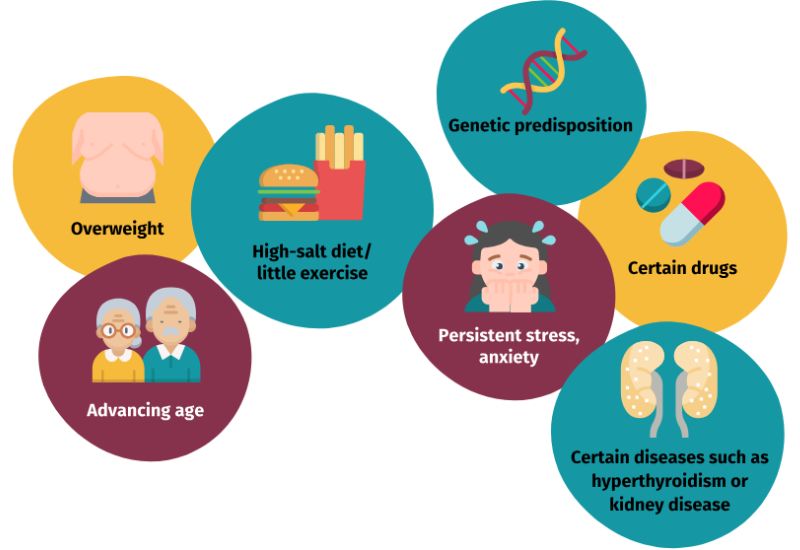
There are many causes of elevated blood pressure.
4. Serious Complications of Hypertension
Uncontrolled hypertension can lead to several serious health issues:
– Heart failure: The heart works harder to pump blood, causing it to enlarge and weaken over time.
– Kidney failure: Narrowed blood vessels in the kidneys can lead to kidney failure.
– Heart attack: High blood pressure damages artery walls, promoting atherosclerosis and increasing the risk of heart attacks.
– Aneurysms: Excessive blood flow can cause arteries to balloon and rupture, posing life-threatening risks.
– Stroke: High blood pressure can lead to brain hemorrhage or cerebral infarction, causing sudden death or disability.
– Metabolic disorders: Elevated insulin levels, increased waist circumference, and reduced HDL cholesterol levels are common in hypertensive patients.
– Retinal hemorrhage: Burst blood vessels in the eyes can impair vision or cause blindness.
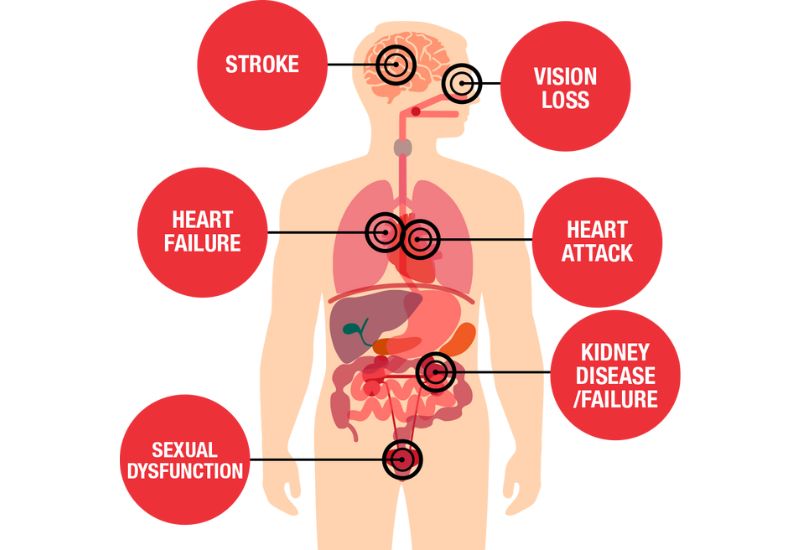
If left untreated, hypertension can lead to dangerous complications.
5. Prevention and Treatment to Stabilize Blood Pressure
Hypertension can be managed effectively if detected early. Changes in diet, lifestyle, and habits play a crucial role in preventing and treating hypertension.
5.1. Preventive Measures
– Regularly monitor blood pressure with home devices.
– Avoid alcohol and tobacco.
– Consume more fruits and vegetables.
– Reduce stress.
– Exercise regularly to maintain a healthy weight and promote relaxation.
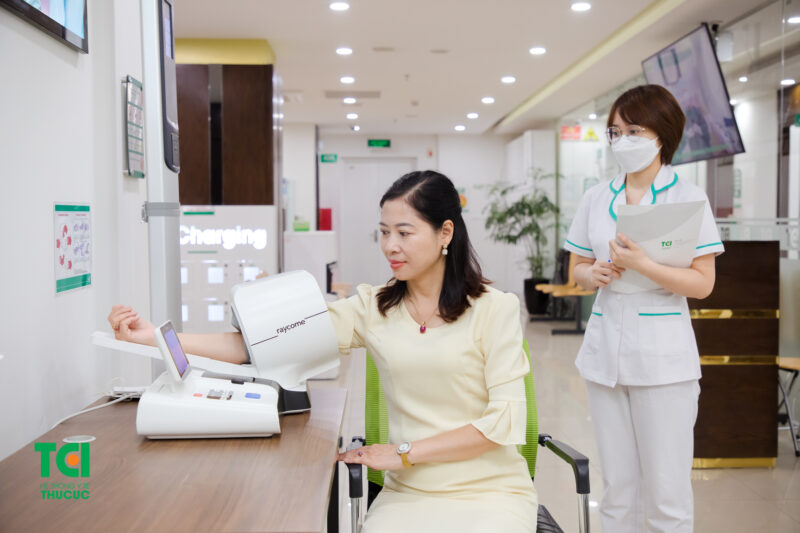
Hypertension is a chronic disease that cannot be completely cured but can be effectively managed with the help of cardiologists.
5.2. Treatment Methods
Early detection of hypertension is vital. The goal is to lower blood pressure to normal levels (below 140/90 mmHg). Common medications include:
– Calcium channel blockers: nifedipine, felodipine, amlodipine
– ACE inhibitors: captopril, valsartan, losartan, lisinopril
– Beta blockers: bisoprolol, metoprolol
– Diuretics
If you experience any symptoms of high blood pressure, seek immediate medical attention. Even without symptoms, regular check-ups are important to catch potential risks early.
In summary, hypertension is a dangerous condition that requires timely and effective treatment. Trustworthy cardiovascular screening and treatment centers, staffed by experienced specialists, can provide the optimal care needed for managing and preventing high blood pressure.




